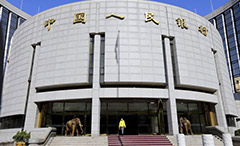Foreigners like China’s internet economy
2017-05-01
Xinhua
Before heading to his favorite restaurants or smaller eateries, Roberto, an Argentine man in Hangzhou, capital of Zhejiang province, usually goes online first. “At a virtual restaurant, everything is set. Even the dishes you are going to order can be selected online,” he said.
“Cash in China is increasingly unnecessary,” Roberto said. “The only time I used cash was to refill my transit card, and now you can do that with Alipay. Any other kind of purchase can be done through WeChat or Alipay, from a few cents to thousands of yuan.”
What’s more, “Alipay and WeChat offer services for purchasing cinema tickets and many applications for buying all kinds of events online, or discounts at restaurants”, he added.
Roberto, who is studying for a master’s degree in international trade at Zhejiang Gongshang University, is one of the many foreigners in China who are experiencing the dynamics of the internet economy and enjoying the convenience it has brought to everyday life.
“Shopping online in China is amazing, whether through Taobao or JD.com (two e-commerce giants) or even WeChat (a multipurpose social media app),” he said.
“The speed and convenience of receiving packages is incredible. I still can’t believe how they handle millions of packages and everything arrives. I have never had a problem,” added Roberto, who has been living in Hangzhou for almost two years.
Hangzhou is the place where Chinese e-commerce giant Alibaba is headquartered.
Alibaba President Jack Ma recently called for making the absolute most of the “historic opportunity” brought by internet development in China.
The internet is driving the economic growth in China, home to about 731 million users-roughly the population of Europe-and 695 million users surfing online via mobile phones.
The world’s largest and fastest-growing e-commerce market is expected to expand transactions to more than 40 trillion yuan ($5.8 trillion) by 2020, according to China’s 2016-20 e-commerce development plan.
A report released by the China Internet Network Information Center in January showed that more than 45 percent of Chinese companies made purchases and sales on the internet in 2016.
China is “going all virtual”, Roberto said.
Marivi Bermejo, a Spaniard living in Shanghai and specializing in organizing and marketing international trade fairs and events, also noted that compared with many countries, everyday life in China is extremely digitized.
“The great majority of payments are made via mobile phones, with WeChat being one of the two most often used apps,” Bermejo said.
“It offers a very convenient mode of payment-simple, secure, accepted at almost all types of establishments and businesses,” she said.
“Once your bank card is connected to your WeChat account, all you have to do is to scan the QR code generated with each purchase,” said Bermejo, who was born in Madrid.
WeChat began as an instant messaging app but has been expanded to include a wide variety of monetary services, from online payments to money transfers and even “applying for loans”, she said.
“In China, you can survive perfectly without cash,” she added.


